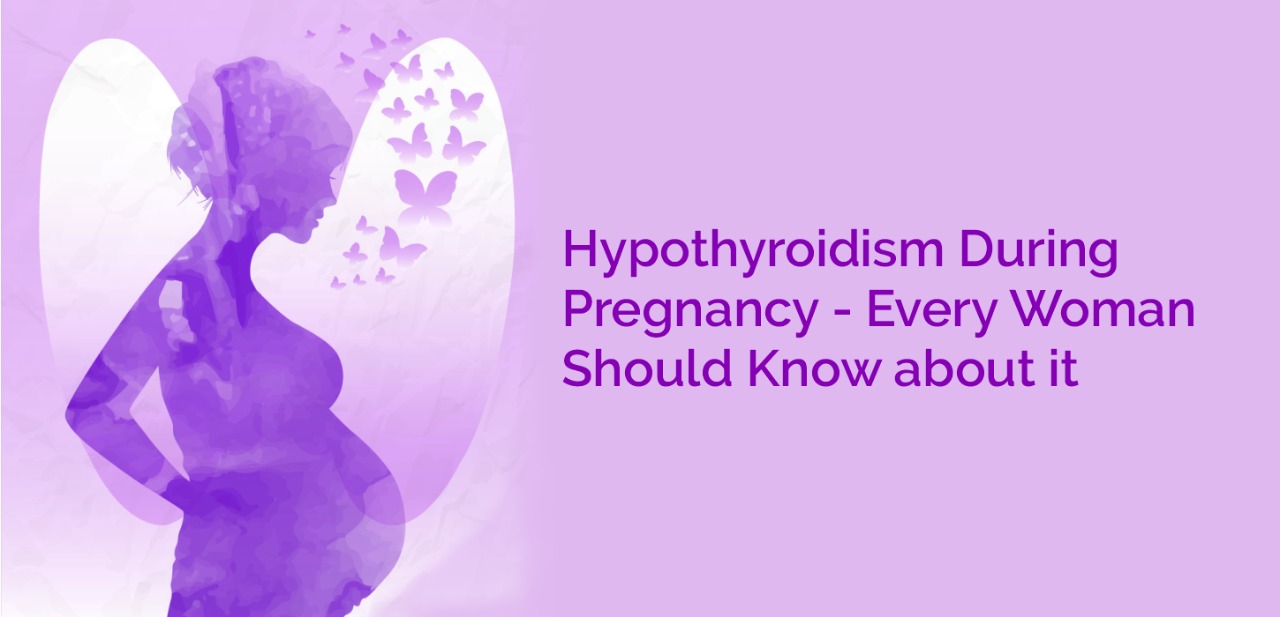

Hypothyroidism is a condition in which the thyroid gland fails to produce sufficient T3 and T4 hormones. This butterfly-shaped gland is located on your front neck and helps in the following body functions:
- Brain development of the foetus
- Regulates heart, muscle and digestive function of the body
- Improves breathing
- Aids heart and nervous system to perform regular functions efficiently
- Maintains temperature, muscle strength and cholesterol levels of your body
- Balances menstrual cycles of women
- Regulates body weight and metabolism
Hypothyroidism during pregnancy is a serious concern because it plays such a crucial role in maintaining the mother’s health and the growth of the unborn child.
Types of Hypothyroidism
According to the American Thyroid Association, hypothyroidism is of two types:
- Subclinical Hypothyroidism: Your diagnosis indicates subclinical hypothyroidism when your TSH (Thyroid Stimulating Hormone) levels are high but T4 levels are normal. It is an early and mild form of hypothyroidism and is common during pregnancy.
- Overt Hypothyroidism: Subclinical hypothyroidism gradually leads to overt hypothyroidism if not treated. It’s a chronic form of hypothyroidism in which your TSH increases and T4 falls.
Causes of Hypothyroidism
Foetus can’t produce enough thyroid hormones for itself until about 18-20 weeks of pregnancy. It receives this hormone from the mother for the efficient development of the brain and nervous system.
Women having one or more of the below-mentioned conditions are at higher risk of developing hypothyroidism during pregnancy:
- Hashimoto Thyroiditis: Hashimoto disease instigates the immune system to attack the thyroid gland and causes inflammation. Due to this, the gland’s ability to produce, store and release hormones decreases.
- Iodine Deficiency: Iodine is required in our body to make thyroid hormones. Its deficiency may lead to hypothyroidism. Severe iodine deficiency can also cause low IQ and abnormal foetal development etc.
- Family History of Hypothyroidism: If your family has a history of hypothyroidism, you’re at higher risk of getting this medical condition as it is often hereditary.
- Auto-immune Disorder: In auto-immune disorders, such as type 1 diabetes or rheumatoid arthritis, your own immune system doesn’t cooperate with the body and attacks it. If you’ve any such disorder, then you might develop hypothyroidism.
- Thyroid Surgery or Radiation On The Neck Area: You may suffer from hypothyroidism after having thyroid surgery or radiation on the neck area since they may cause thyroid gland's malfunctioning.
Symptoms of Hypothyroidism
Symptoms of hypothyroidism include:
- Extreme fatigue
- Cold intolerance
- Concentration problem
- Feeling of nausea
- Constipation
- Depression
- Sudden weight gain
- Dry skin and hair and brittle nails
- Constipation
- Hair loss
- Muscle weakness/cramps
- Shortness of breath during physical activity
- Hoarse voice
- Swelling
- Goitre (an enlarged thyroid gland that appears as a bulge on the neck)
How Hypothyroidism Affects Mother and Baby?
Untreated and uncontrolled hypothyroidism may cause the following problems during pregnancy:
- Miscarriage
- Pre-eclampsia (a condition causing high blood pressure)
- Premature delivery
- Abnormal development of the foetus
- Anaemia
- Low birth weight
- Stillbirth
- Congestive heart failure, in rare cases
- A lower level of IQ in the baby
Diagnosis Of Hypothyroidism
Initially, doctors analyse the symptoms you are experiencing. After that, they may take a blood sample for measuring,
- Thyroid Stimulating Hormone (TSH) and T4: TSH encourages the thyroid to make T3 and T4. When the T4 level is low, the body produces more TSH leading to high TSH level. A high TSH and low T4 level suggest hypothyroidism.
- Antibody Test: If you suffer from hypothyroidism due to Hashimoto disease, you need to undergo an antibody test to check for abnormalities.
Every pregnant woman should take thyroid disorder tests even if she experiences no symptoms. During pregnancy, women undergo hormonal changes. Human Chorionic Gonadotropin (HCG) and estrogen are two hormones released during pregnancy that increase thyroid hormone levels.
HCG is like TSH and instigates the thyroid gland to produce more thyroid hormone. When estrogen increases, it increases thyroid-binding globulin level, a protein transferring thyroid hormone in your blood. Because of these changes, a pregnant woman may or may not feel any different at the initial stage despite suffering from hypothyroidism.
During pregnancy, the thyroid should be tested every 6-8 weeks until delivery.
How Should a Woman with Hypothyroidism be Treated During Pregnancy?
1. Thyroxine or Levothyroxine Medication:
- It’s a synthetic thyroid hormone like the T4 made by the thyroid gland. It controls your metabolic rate.
- Avoid taking thyroid medicine and prenatal vitamins or supplements containing calcium and iron together as these can interfere with the thyroid hormone absorption. You may take them in a 2-3 hours’ gap.
- Endocrinologists suggest its dosage based on severity of hypothyroidism and stage of pregnancy.
2. Dietary Supplement:
Pregnant women require 250 mcg of iodine a day through food and supplement.
Prevent Measures To Keep Hypothyroidism Under Control
A woman's thyroid hormone level must be normal before and during pregnancy. She should get her thyroid level checked before trying to conceive if she's already taking levothyroxine. If her TSH level is high, delaying pregnancy would be a smart choice until it gets normalised by increasing levothyroxine dosage.
If a woman has hypothyroid and gets pregnant, then she must immediately consult a doctor. The levothyroxine dose must increase by 30% or more in 4-6 weeks of pregnancy to normalise the T4 level. After delivery, she may need to decrease the levothyroxine dose as suggested by the doctor.
You can consult with an Assurance Endocrinologist to get proper thyroid care and effective treatment at NHAssurance.